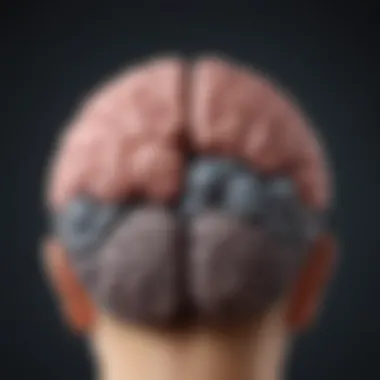Effective Strategies to Overcome Ruminating Thoughts


Research Overview
Intro to the topic under study
Rumination is a known cognitive pattern, often leading to the repetitive focus on distressing thoughts or experiences. This mental behavior not only affects one’s emotional state but can exacerbate anxiety and depression, ultimately diminishing overall well-being. Understanding the dynamics of rumination is crucial, as many individuals experience it in various forms. Delving into its causes, methods, and solutions can provide valuable insights for a more balanced mental state.
Summary of existing research findings
Evidence supports the notion that chronic rumination associates with several psychiatric disorders. Researchers found that individuals prone to restless thought processes often experience greater emotional dysregulation. Studies indicate a linkage between highly ruminative individuals and solutions that tend to fail over time. Addressing these cognitive repetitions becomes essential to improve mental health outcomes.
Key research methodology explained
Research in this area often employs both qualitative and quantitative approaches. One main method involves longitudinal studies where participants' thought patterns are monitored over time. Surveys or self-report questionnaires aim to gauge ruminative tendencies and correlations with mental health discrepancies. Additionally, case control studies can illuminate differences between individuals who ruminate and those who adapt better to stress and adversity.
Health Implications
Discussion on the impact of the research on health
The findings suggest that stopping rumination is connected to better health. By interrupting the negative feedback loops thought patterns reinforce, individuals may experience decreased levels of anxiety and enhanced mood stability. Mental health practitioners view managing these interruptions as an effective strategy for preventing or mitigating mood disorders.
Exploration of potential benefits and risks
Improving mental resilience has many benefits, notably through practices like mindfulness or cognitive behavioral therapy. However, there can be risks if interventions don’t account for individual differences, such as severity of ruminative thoughts, prevailing mental healthstatus, or willingness to engage with these changes. Tailored approaches enable more effective outcomes for different personas in the battle against rumination.
Examples of how the findings can be applied in daily life
In daily life, managing limited ruminative episodes leads to improvement in focus, relationships, and overall existence. By challenging pervasive thought patterns through positive distractions or constructive activities, people can reclaim their day. Simple steps also enhance emotional awareness, aiding individuals in identifying when they fall back into ruminative styles.
Well-being Strategies
Practical tips and strategies derived from the research
Engaging in activities that foster both enjoyment and learning caliber can provide much-needed interrupt to ruminative thoughts. Some effective strategies might include:
- Proactively seeking social support from friends or family to discuss troubling thoughts.
- Gravitating towards physical exercises like walking or yoga, which have shown efficacy in reducing mental noise.
- Writing in a journal to externalize thoughts rather than letting them circle endlessly.
- Practicing mindfulness meditation, which enables individuals to focus on the present moment.
Advice on implementing positive changes for well-being
Start incorporating even small changes. Set aside specific timeframes for these activities and gradually integrate new practices as part of your daily routine. Reflecting on emotions and thoughts in journals connects you more meaningfully to what you experience.
Personal stories or case studies supporting the strategies
Key studies present compelling case observations. For instance, one individual utilized journaling to navigate thoughts after a traumatic event. Over time, engaging this strategy allowed them coastline by focusing on other encounters rather than the preceding distress. These instances underline that simple, actionable strategies can shift thought patterns notably.
Expert Insights
Analysis of expert opinions on the research findings
Experts advocate for recognizing ruminative trends in daily behavior as a strada hacia healing. Having clear indicators of high ruminatalotion strongly indicates when someone needs to steer into mindful actions instead. Opinions converge on the fact that awareness and intervention must operate hand-in-hand for effective transformations.
Q&A session with a relevant expert on the topic
In discussion with Dr. Janice Lockheart, a clinical psychologist:
Q: What can be the best starting point to combat rumination?
A: Engaging small actions consistently can prove beneficial. Learning which thought patterns trigger ruminative loops is key to modifying them. Finding tangible breaks can help diversify focus and mitigate ruminative cycles.
Understanding Rumination
Rumination is a critical concept in understanding mental health and wellness. This section sets the stage for examining how prolonged and repetitive thinking about past events can have significant psychological effects. Recognizing the nature of rumination is crucial for individuals trying to overcome it. The key benefits of understanding this pattern include identifying triggers, reducing stress, and improving emotional regulation.
Definition and Nature of Rumination


Rumination can be defined as the process of continuously thinking about the same topics, specifically negative experiences or scenarios. It goes beyond normal reflection. Instead, it involves a cycle of thoughts that do not lead to solutions but rather intensify feelings of distress. For instance, an individual might replay events over and over, feeling stuck in the past. This nature of rumination can create a mental fog, making it difficult to engage in the present moment.
The Psychological Impact of Rumination
The impact of rumination on mental health is profound. Studies show that it can lead to disorders such as anxiety and depression. According to research, those who ruminate often miss opportunities for joy and connection with others. They may struggle with feelings of worthlessness or helplessness. Additionally, chronic rumination can weaken the ability to cope effectively during tough times.
"Learned helplessness arises when individuals perceive themselves as lacking control over their circumstances, often a consequence of sustained rumination."
Understanding this dynamic helps individuals recognize the detrimental effects ruminative thought can have on their daily lives.
Common Triggers of Ruminative Thought
Various situational, emotional, and cognitive triggers lead to ruminative thoughts. Some common ones include:
- Stressful events: Major disputes or setbacks compel an individual to revisit painful experiences.
- Perceived failures: Feelings of inadequacy can result from real or imagined shortcomings, causing individuals to ruminate on those instances.
- Personality traits: Certain individuals may have a predisposition to ruminate, often if they display high levels of neuroticism or conscientiousness.
Identifying these triggers lays the groundwork for developing targeted strategies to combat rumination. By focusing on the elements of their life that prompt cyclic thinking, individuals can begin the journey toward mental clarity and peace.
The Science Behind Rumination
Understanding recent advances in rumination research underscores its complexity and significance. This section dissects the psychological underpinnings of ruminative thought patterns and details how these repetitive thoughts can be both damaging and enlightening. Insights into rumination underscore its relevance to mental health, offering beneficial angles for those seeking to mitigate its impact. By examining the cognitive processes at play, the relationship with mental health issues, and the underlying neuroscience, individuals can grasp the full scope of what makes rumination such a pervasive struggle and how they might combat it.
Cognitive Processes Involved in Rumination
Cognitive processes are at the core of rumination. This thinking style often involves concentrated attention on distressing information or negative feedback from experiences. Key elements include:
- Repetitive Thoughts: Individuals may ruminate on specific events or worries, analyzing and re-analyzing experiences without conclusion.
- Negative Attribution: People often form negative connections or assumptions about those events that reinforce current emotions, leading to more cognitive activity in that limited space.
- Perspective-taking: Some individuals may consider others' viewpoints too much, which can affect their internal emotional landscape deeply. It hinders functional cognitive processing.
Research shows that these patterns result in a feedback loop, where original thoughts snowball into more detailed and often distressing narratives. Understanding these cognitive styles provides groundwork for effective interruption methods.
Rumination's Relationship with Mental Health
The correlation between rumination and adverse mental health outcomes is well documented. The effects include:
- Anxiety: Lengthy periods of ruminative thought can precipitate heightened anxiety levels, worsening the psychological state of an individual.
- Depression: Continuous negative rumination has been linked with increased chances of developing depression, as the person becomes burdened by heavy emotional content.
- Stress Response Impairment: Rumination can diminish an individual’s ability to cope with new stressors, given that energy is consumed by thoughts of the past.
This sequence affects interpersonal relationships and day-to-day life, limiting overall engagement and satisfaction. Acknowledging this relationship plays a crucial role in understanding why tackling rumination is vital for better mental health management.
Neuroscience of Ruminative Thinking
Neuroscientific studies have further illuminated the biology behind rumination. Notably, rumination is often associated with specific brain regions such as:
- The Prefrontal Cortex: Involved in executive functions, its activity can increase during rumination but remains skewed toward negative thoughts.
- The Amygdala: Known for its role in processing emotion, heightened activity here during ruminative periods can lead to exaggerated emotional responses.
Research suggests that distinct neurological responses activate during periods of rumination, influencing emotional regulation negatively. Key points include:
- Dopamine Levels: In some cases, imbalance can lead to spirals of disruptive biological processes, fostering rumination.
- Affective Perturbation: Long-term, the excessive reiteration of distressing thoughts can rewire neural pathways, locking an individual in undesired thought patterns.
Understanding this neuroscience amplifies awareness of ruminative cycles and opens pathways for therapeutic approaches to more effectively break the cycle. These insights cumulatively stress the profound nature of ruminate basing all pathways of life.
Recognizing Ruminative Patterns
Recognizing ruminative patterns is a critical aspect of understanding and managing incessant self-reflection. Becoming aware of how rumination manifests can empower individuals. Acknowledging these thoughts is the first step toward interruption. This awareness helps in escaping negative thought spirals, thus fostering healthier mental habits.
Identifying Ruminative Thoughts
To effectively reduce rumination, it is essential to accurately identify ruminative thoughts. These thoughts often circulate around specific themes such as regret, fear, or doubt. Pay attention to the frequency of these thoughts. Lost opportunities and anticipating negative outcomes commonly perpetuate rumination.
When recognizing these cognitive patterns, consider some specific signs:
- Recurring scenarios in discussions with yourself.
- Excessive focus on minor issues or past events.
Making a habit of journaling can be quite useful. Writing down ruminative thoughts may provide clarity. With reflection, these thoughts can be dissected, revealing the core issues.


Monitoring Emotional Responses
After identifying specific ruminative thoughts, the next step is monitoring emotional responses. Rumination is often tightly linked to heightened emotional responses, which can include anxiety, frustration, or sadness. Assessing how certain thoughts affect your feelings is vital.
One approach is to create an emotional diary. This can detail moods associated with various thoughts. Over time, patterns may emerge, highlighting which thoughts exacerbate negative feelings.
Key aspects to note include:
- The intensity of emotions.
- Duration of emotional states prompted by ruminative thoughts.
Understanding these emotional triggers can pave the way for developing strategies to cope with these feelings when they arise.
Distinguishing Healthy Reflection from Rumination
Finally, it is important to differentiate healthy reflection from rumination. Healthy reflection promotes growth and understanding, while rumination leads to stagnation and distress.
Ask yourself the following: What purpose does this thought serve? Am I learning or am I stuck?
Healthy reflection typically encompasses:
- Solution-oriented thinking about problems.
- Constructive review of past actions.
In contrast, rumination involves persisting over thoughts without resolution. Recognizing when you drift into rumination can alter your mental approach. Deliberately transitioning back to positive reflection is essential.
Understanding these elements of recognition cultivates self-awareness, helping individuals combat consumption by ruminating thoughts.
Overall, the journey begins by recognizing these patterns. A structured approach assists greatly in reducing them over time.
Practical Strategies to Stop Ruminating
Rumination can distract and hinder productivity. Managing ruminative thoughts is pivotal for maintaining mental clarity and emotional well-being. In this section, we will explore practical strategies that target rumination. Examining these methods brings light on their mechanisms and gives readers tools to combat their spiraling thoughts. By employing these strategies, individuals can enhance their cognitive abilities, foster positive emotional habits, and live with more purpose.
Cognitive Behavioral Techniques
Cognitive Behavioral Therapy (CBT) techniques are effective in breaking the cycle of rumination. These methods aim to change patterns of thinking and behavior, which often contribute to negative feelings. Through CBT, one identifies cognitive distortions in their thinking style. Common distortions include overgeneralization or filtering out positive experiences. Addressing these leads to healthier thinking patterns.
Some specific techniques within CBT include:
- Thought Records: Writing down ruminative thoughts to challenge negativity and track shifts.
- Cognitive Restructuring: Actively reframing negative thoughts to see situations in a more balanced way.
These techniques encourage introspection, shifting perspectives, and honing rational thinking skills. Practicing CBT with guidance can offer significant benefits in managing rumination.
Mindfulness and Its Benefits
Mindfulness has gained attention for its capacity to mitigate rumination. The practice encourages individuals to become aware of their thoughts and feelings without judgment–keeping a distance reduces their emotional charge. Mindfulness practices can range from meditation to simple breathing exercises.
Engaging in mindfulness has several advantages:
- Increased Awareness: Observing thoughts as they arise, instead of getting lost in them.
- Emotional Regulation: Greater control over reactions to thoughts and events.
- Stress Reduction: Regular practice can lower anxiety levels and improve general mood.
Focusing on the present diminishes the impact of past preoccupations and future worries. Individuals can cultivate joy and contentment in their lives through mindfulness.
Engaging in Positive Activities
Occupying oneself with rewarding activities is essential in reducing ruminative thought processes. These actions can redirect attention and foster joy.
Consider integrating these positive activities into your routine:
- Outdoor Exercise: Engaging in nature can clear the mind and revitalize energy.
- Creative Expression: Activities like painting, writing, or playing music channel emotions constructively.
- Social Connections: Spend time with supportive friends or family to share feelings and experiences.
Structuring a regular hobby or volunteer work can fortify resilience against ruminating thoughts. These activities not only distract but also build confidence and a sense of purpose. Engaging with others bolsters support networks that further alleviate melancholy.
"The key to declining ruminative thoughts lies in action, awareness, and adaptation."


These practical strategies arm individuals with tools and insight to mitigate rumination and enhance daily functioning.
The Role of Professional Help
Professional assistance can offer profound benefits for those struggling with rumination. Individual experiences with ruminative thoughts can vary greatly, and often, self-help strategies might not be enough to address the complex cognitive patterns involved. This is where guidance from trained professionals becomes invaluable. Psychiatrists, psychologists, and counselors can provide targeted support, implementing evidence-based techniques that inspire lasting change.
Seeking professional help acknowledges the seriousness of the issue. Prioritizing mental health through professional means removes the stigma often associated with it. There can be a sense of accountability that comes from working with a specialist, which encourages a more productive approach to curbing ruminative tendencies. Documenting one’s experiences with professionals helps in identifying deep-seated triggers that one may not recognize on their own.
Therapeutic Approaches to Address Rumination
Therapeutic interventions can establish a collaborative framework. Cognitive Behavioral Therapy (CBT) specifically has shown effectiveness in treating rumination. In CBT, individuals learn to identify their negative thought patterns and gradually challenge them. This process involves restructuring distorted cognitions, fostering healthier thinking.
Mindfulness-Based Cognitive Therapy (MBCT) is another commendable method. It blends traditional cognitive therapy with mindfulness strategies, teaching clients to observe their thoughts without attachment. Such skills empower individuals to create space between themselves and their ruminative thoughts, reducing their intensity over time.
Moreover, group therapy settings can enrich the therapeutic experience. Group dynamics facilitate peer support, normalization of experiences, and an exchange of strategies. Participants often gain new perspectives, harnessing the strength of shared narratives.
Medication and Its Effects
In some cases, medication might be an appropriate adjunct to therapy. Antidepressants, such as selective serotonin reuptake inhibitors (SSRIs), can disrupt the cycle of negative thoughts prevalent in ruminators. These medications help by regulating neurotransmitters associated with mood and anxiety, indirectly lessening rumination frequency.
Finding the right medication may take time. Consulting with a psychiatrist can optimize this process. They will carefully assess an individual’s symptoms, medical history, and possible side effects before recommending appropriate options. If chosen wisely, medication enhances overall cognitive flexibility, assisting in breaking ruminative patterns.
Considerations surrounding medication include awareness of potential dependency. Communicating ongoing symptoms with healthcare providers ensures that one can address adjunct treatments without unintended consequences in the long run. Treatment planning must be holistic.
Support Groups and Community Resources
Engaging in support groups can mitigate the feelings of isolation that accompany rumination. Various communities offer spaces where individuals can share their experiences with like-minded peers. This shared support often leads to a sense of belonging and validation. Additionally, these groups facilitate workshops or discussions led by trained facilitators, promoting awareness about coping strategies.
Community resources also exist to aid individuals dealing with rumination. Many local organizations provide workshops focused on mental health awareness and skills-building. They often foster healthy discussion about cognitive methods to combat rumination, enhancing social connections.
In many circumstances, a simple search on platforms like subreddit community forums or Facebook groups will yield diverse support options. IRL support networks and community initiatives greatly reduce feelings of helplessness. Building these connections extends beyond addressing ruminative thoughts; it cultivates a more encompassing sense of wellbeing.
Professional help is not a sign of weakness but a powerful way to reclaim your mental space and well-being.
Long-Term Management of Rumination
Long-term management of rumination is crucial for maintaining mental well-being. It encompasses various strategies that empower individuals to recognize, address, and ultimately reduce ruminative thinking patterns over time. Unlike temporary solutions, long-term management seeks sustainable practices that can diminish the habitual nature of these thought spirals. Effective management not only helps in creating mental peace but also enhances one's overall quality of life.
Developing Resilience Against Ruminative Thinking
Resilience is an essential quality when it comes to combatting rumination. By fostering resilience, individuals can stand better against the urge to dwell on negative thoughts. Developing this trait involves several aspects. Firstly, fostering a growth mindset is vital. This involves viewing challenges as opportunities for personal development. Secondly, practicing self-compassion can reduce the severity of negative self-talk. Recognizing that everyone faces difficulties and showing kindness to oneself lays the groundwork for stronger mental health.
Regular engagement with challenging but enjoyable activities can also improve resilience. This might include artistic pursuits, physical exercise, or new hobbies that foster engagement with the world. The enhanced confidence and sense of agency that come from overcoming these challenges help in re-routing ruminative cycles. An additional tactic is journaling, where individuals articulate feelings through writing, diverting attention from repetitive thoughts.
Creating a Supportive Environment
The environment plays a pivotal role in influencing mental health. A supportive environment can counteract the pressures that trigger rumination. This involves both physical and social aspects. Surrounding yourself with open-minded, empathetic people is one step towards a positive support system. Support from friends, family, or communities can provide important emotional backing.
On a physical level, decluttering one’s workspace can create a more serene atmosphere, reducing stress triggers that encourage rumination. (
Epilogue
Rumination is a pervasive mental process that can impair emotional well-being. This article highlights that effectively managing rumination is essential for mental clarity and overall health. By implementing mindful strategies, individuals can break free from harmful thought cycles.
Summary of Key Insights
In summary, this article consolidates various functional techniques for combating rumination. Key strategies include:
- Cognitive Behavioral Techniques: Identifying and restructuring negative thought patterns can diminish rumination.
- Mindfulness Practice: Engaging in mindfulness helps center thoughts and reduce anxiety.
- Positive Activities: Focusing on enjoyable hobbies and supportive interactions promotes positive thinking.
These techniques, reinforced with professional guidance when necessary, form a robust framework to combat ruminative thinking.
“The greatest weapon against stress is our ability to choose one thought over another.” – William James
Encouragement for Continued Learning
Acknowledging the challenge of stopping rumination is the first step. Each reader is educated about their mental habits through this article, but learning should not cease here. Exploring more resources and practices will further enhance mental health. Books on cognitive behavioral therapy, mindfulness courses, and engaging in discussion within community resources can empower individuals.
Taking the initiative to apply insights continuously contributes to long-term mental wellness. Building resilience against ruminative thoughts is not achieved overnight. Rather, it requires consistent effort and commitment to personalgrowth.



